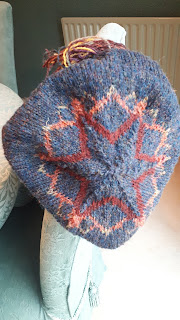I've been thinking about Christmas a lot over the last few days - it's the time of year when friends start asking what I want for that and my birthday. It's not a question I find easy to answer. I love getting and giving presents every bit as much as I dislike putting pressure on people to meet a certain spending expectation. This year I'm mostly directing people towards my amazon wish list. I know they're not the ideal company, but they do make things like sharing a wish list really easy and I like that for so many reasons.
I've also been thinking a lot about the pressure we put on ourselves to make this time of year perfect - or at least some approximation of it. I suspect a lot of this pressure is something that women apply to ourselves and each other. Men aren't by any means exempt from this, but it's normally women writing about the emotional labour the season demands of them and worrying that if they delegate the other person will get it wrong. Which they well might, but the question is, how much does it matter?
Twenty years in retail made an already complicated relationship with Christmas more complicated. I came to both really dislike the excessive consumption (yes, we needed them to spend that much, but the sheer quantity of it is mind boggling at times) and really want to be the person on the receiving end of those bottles of very good champagne, jewelers bags, luxury this or that, and time off.
This year might have been shit in a ton of ways, but it's been excellent for readjusting expectations and thinking about what traditions to keep and which to take a break from. Neither mum or I are feeling particularly festive yet, although her whole village seems to have put up decorations this weekend so that might change quite fast. Her surgeon told her she could spend as much time cooking and washing up as she likes (???) so I might try and persuade her to make mince pies tomorrow as some sort of unlikely physio therapy and because she makes amazing mince pies.
I've also been using the time to make presents for people - very handsome hats, which take an age. Turns out there are more people I'm inclined to give things to than I realised, and that buying stuff is a lot easier than making it. On the other hand I really like spending the time thinking about the person I'm knitting for - what colours they might like, if there's a particular motif that seems appropriate, the possibility of meeting up for a walk... The labour here is definitely self imposed, as it will be when I start writing cards, and making fudge I can leave for the neighbours who have kept an eye on things for me these last few weeks.
But then it makes me feel like I'm part of a community which is something I want. My partner doesn't really bother with any of it beyond sending half a dozen cards. The sparkly bit of Christmas doesn't matter to him in the same way it does to me, but that doesn't make the decision about whether it's going to be safe or sensible to go and see his 94 year old father any easier. I might make more effort, but our priorities are much the same - it's the trimmings that are different and in the scheme of things they're much less important.
Anyway, my December posts are likely to be full of Christmas recommendations, whilst the conversations I'm having with friends are all about the tough decisions we're all having to make this year about balancing family needs, managing expectations, and what we wish we could do. Sometimes we can pull that off, but quite often it's impossible. There's no failure in not keeping everybody happy, and this is not the year to worry about falling short, to over extend on the spending, or let anyone make us feel bad about the things we decide not to do.











